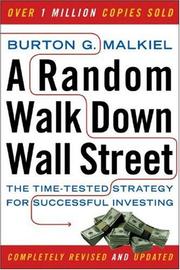| Listing 1 - 7 of 7 |
Sort by
|

ISBN: 1280641959 9786610641956 0080462847 0444527354 9780444527356 9780080462844 9781280641954 6610641951 Year: 2006 Publisher: Amsterdam Boston Oxford Elsevier
Abstract | Keywords | Export | Availability | Bookmark
 Loading...
Loading...Choose an application
- Reference Manager
- EndNote
- RefWorks (Direct export to RefWorks)
The aim of this book is to report on the progress realized in probability theory in the field of dynamic random walks and to present applications in computer science, mathematical physics and finance. Each chapter contains didactical material as well as more advanced technical sections. Few appendices will help refreshing memories (if necessary!).· New probabilistic model, new results in probability theory· Original applications in computer science· Applications in mathematical physics· Applications in finance
Random walks (Mathematics). --- Mathematics --- Physical Sciences & Mathematics --- Mathematical Statistics --- Random walks (Mathematics) --- Stochastic processes. --- Random processes --- Additive process (Probability theory) --- Random walk process (Mathematics) --- Walks, Random (Mathematics) --- Probabilities --- Stochastic processes

ISBN: 1280628812 9786610628810 008046047X 044451709X 9780080460475 9780444517098 Year: 2005 Publisher: Amsterdam : Elsevier,
Abstract | Keywords | Export | Availability | Bookmark
 Loading...
Loading...Choose an application
- Reference Manager
- EndNote
- RefWorks (Direct export to RefWorks)
With the mapping of the partition function graphs of the n-vector magnetic model in the n to 0 limit as the self-avoiding walks, the conformational statistics of linear polymers was clearly understood in early seventies. Various models of disordered solids, percolation model in particular, were also established by late seventies. Subsequently, investigations on thestatistics of linear polymers or of self-avoiding walks in, say, porous medium or disordered lattices were started in early eighties. Inspite of the brilliant ideas forwarded and extensive studies made for the next two decades,
Polymers --- Random walks (Mathematics) --- Self-avoiding walks (Mathematics) --- Mathematical models. --- Additive process (Probability theory) --- Random walk process (Mathematics) --- Walks, Random (Mathematics) --- Stochastic processes --- Polymere --- Polymeride --- Polymers and polymerization --- Macromolecules

ISBN: 9780393330335 Year: 2007 Publisher: New York W.W. Norton
Abstract | Keywords | Export | Availability | Bookmark
 Loading...
Loading...Choose an application
- Reference Manager
- EndNote
- RefWorks (Direct export to RefWorks)
Investments. --- Beleggingen --- Stocks. --- Random walks (Mathematics) --- Additive process (Probability theory) --- Random walk process (Mathematics) --- Walks, Random (Mathematics) --- Stochastic processes --- Common shares --- Common stocks --- Equities --- Equity capital --- Equity financing --- Shares of stock --- Stock issues --- Stock offerings --- Stock trading --- Trading, Stock --- Securities --- Bonds --- Corporations --- Going public (Securities) --- Stock repurchasing --- Stockholders --- Investing --- Investment management --- Portfolio --- Finance --- Disinvestment --- Loans --- Saving and investment --- Speculation --- Random walks (Mathematics). --- Investments --- Stocks
Book
ISBN: 1281790192 9786611790196 0080871909 0444865675 Year: 1983 Publisher: Amsterdam : North-Holland,
Abstract | Keywords | Export | Availability | Bookmark
 Loading...
Loading...Choose an application
- Reference Manager
- EndNote
- RefWorks (Direct export to RefWorks)
Boundary Value Problems in Queueing System Analysis
Boundary value problems. --- Queuing theory. --- Random walks (Mathematics) --- Additive process (Probability theory) --- Random walk process (Mathematics) --- Walks, Random (Mathematics) --- Stochastic processes --- Erlang traffic formula --- Queueing theory --- Theory of queues --- Waiting-line theory --- Production scheduling --- Boundary conditions (Differential equations) --- Differential equations --- Functions of complex variables --- Mathematical physics --- Initial value problems

ISBN: 0691057745 0691092567 9786613371843 1400829097 1283371847 9781400829095 9780691092560 9780691057743 Year: 2011 Publisher: Princeton, NJ
Abstract | Keywords | Export | Availability | Bookmark
 Loading...
Loading...Choose an application
- Reference Manager
- EndNote
- RefWorks (Direct export to RefWorks)
For over half a century, financial experts have regarded the movements of markets as a random walk--unpredictable meanderings akin to a drunkard's unsteady gait--and this hypothesis has become a cornerstone of modern financial economics and many investment strategies. Here Andrew W. Lo and A. Craig MacKinlay put the Random Walk Hypothesis to the test. In this volume, which elegantly integrates their most important articles, Lo and MacKinlay find that markets are not completely random after all, and that predictable components do exist in recent stock and bond returns. Their book provides a state-of-the-art account of the techniques for detecting predictabilities and evaluating their statistical and economic significance, and offers a tantalizing glimpse into the financial technologies of the future. The articles track the exciting course of Lo and MacKinlay's research on the predictability of stock prices from their early work on rejecting random walks in short-horizon returns to their analysis of long-term memory in stock market prices. A particular highlight is their now-famous inquiry into the pitfalls of "data-snooping biases" that have arisen from the widespread use of the same historical databases for discovering anomalies and developing seemingly profitable investment strategies. This book invites scholars to reconsider the Random Walk Hypothesis, and, by carefully documenting the presence of predictable components in the stock market, also directs investment professionals toward superior long-term investment returns through disciplined active investment management.
Stocks --- Random walks (Mathematics) --- Prices --- Mathematical models --- Financial organisation --- Additive process (Probability theory) --- Random walk process (Mathematics) --- Walks, Random (Mathematics) --- Stochastic processes --- Mathematical models. --- 305.91 --- 333.613 --- 333.645 --- 339.42 --- AA / International- internationaal --- 336.76 --- 336.76 Beurswezen. Geldmarkt. Valutamarkt. Binnenlandse geldmarkt. Valutamarkt --- Beurswezen. Geldmarkt. Valutamarkt. Binnenlandse geldmarkt. Valutamarkt --- Common shares --- Common stocks --- Equities --- Equity capital --- Equity financing --- Shares of stock --- Stock issues --- Stock offerings --- Stock trading --- Trading, Stock --- Securities --- Bonds --- Corporations --- Going public (Securities) --- Stock repurchasing --- Stockholders --- Prices&delete& --- Econometrie van de financiële activa. Portfolio allocation en management. CAPM. Bubbles --- Activiteiten van de nationale en internationale markten. Beursnoteringen van aandelen en obligaties --- Speculatie op de beurs --- Financiële analyse --- Beleggen. --- Stocks - Prices - Mathematical models
Book
Year: 2017 Publisher: Princeton, [New Jersey] ; Oxford, [England] : Princeton University Press,
Abstract | Keywords | Export | Availability | Bookmark
 Loading...
Loading...Choose an application
- Reference Manager
- EndNote
- RefWorks (Direct export to RefWorks)
The scientific study of complex systems has transformed a wide range of disciplines in recent years, enabling researchers in both the natural and social sciences to model and predict phenomena as diverse as earthquakes, global warming, demographic patterns, financial crises, and the failure of materials. In this book, Didier Sornette boldly applies his varied experience in these areas to propose a simple, powerful, and general theory of how, why, and when stock markets crash. Most attempts to explain market failures seek to pinpoint triggering mechanisms that occur hours, days, or weeks before the collapse. Sornette proposes a radically different view: the underlying cause can be sought months and even years before the abrupt, catastrophic event in the build-up of cooperative speculation, which often translates into an accelerating rise of the market price, otherwise known as a "bubble." Anchoring his sophisticated, step-by-step analysis in leading-edge physical and statistical modeling techniques, he unearths remarkable insights and some predictions--among them, that the "end of the growth era" will occur around 2050. Sornette probes major historical precedents, from the decades-long "tulip mania" in the Netherlands that wilted suddenly in 1637 to the South Sea Bubble that ended with the first huge market crash in England in 1720, to the Great Crash of October 1929 and Black Monday in 1987, to cite just a few. He concludes that most explanations other than cooperative self-organization fail to account for the subtle bubbles by which the markets lay the groundwork for catastrophe. Any investor or investment professional who seeks a genuine understanding of looming financial disasters should read this book. Physicists, geologists, biologists, economists, and others will welcome Why Stock Markets Crash as a highly original "scientific tale," as Sornette aptly puts it, of the exciting and sometimes fearsome--but no longer quite so unfathomable--world of stock markets.
Stocks --- Financial crises --- Prices --- History. --- United States. --- Asia. --- Black Monday. --- Dow Jones Industrial Average. --- Hong Kong. --- Latin America. --- Louis Bachelier. --- Nasdaq index. --- Nasdaq. --- Nikkei. --- Russia. --- South Sea bubble. --- anti-imitation. --- antibubble. --- arbitrage opportunities. --- bubble. --- collapse. --- complex systems. --- computational methods. --- cooperative behavior. --- cooperative speculation. --- crash hazard. --- currency crash. --- derivatives. --- discrete scale invariance. --- drawdown. --- efficient market. --- emergent markets. --- extreme events. --- financial crashes. --- finite-time singularity. --- forward prediction. --- fractals. --- free lunch. --- gold. --- hazard rate. --- hedging. --- herding. --- imitation. --- insurance portfolio. --- log-periodicity. --- market failure. --- natural scientists. --- outlier. --- population dynamics. --- positive feedback. --- power law. --- prediction. --- price-driven model. --- random walk. --- rational agent. --- renormalization group. --- returns. --- risk-driven model. --- risk. --- self-organization. --- self-similarity. --- social network. --- social scientists. --- speculative bubble. --- stock market crash. --- stock market indices. --- stock market prices. --- stock market. --- superhumans. --- sustainability. --- tronics boom. --- tulip mania. --- world economy.
Book
ISBN: 1283646188 1400845408 9781400845408 9780691148762 0691148767 Year: 2012 Publisher: Princeton, NJ
Abstract | Keywords | Export | Availability | Bookmark
 Loading...
Loading...Choose an application
- Reference Manager
- EndNote
- RefWorks (Direct export to RefWorks)
Our path of economic development has generated a growing list of environmental problems including the disposal of nuclear waste, exhaustion of natural resources, loss of biodiversity, climate change, and polluted land, air, and water. All these environmental problems raise the crucial challenge of determining what we should and should not do for future generations. It is also central to other policy debates, including, for example, the appropriate level of public debt, investment in public infrastructure, investment in education, and the level of funding for pension benefits and for research and development. Today, the judge, the citizen, the politician, and the entrepreneur are concerned with the sustainability of our development. The objective of Pricing the Planet's Future is to provide a simple framework to organize the debate on what we should do for the future. A key element of analysis by economists is the discount rate--the minimum rate of return required from an investment project to make it desirable to implement. Christian Gollier outlines the basic theory of the discount rate and the various arguments that favor using a smaller discount rate for more distant cash flows. With principles that can be applied to many policy areas, Pricing the Planet's Future offers an ideal framework for dynamic problems and decision making.
Investments --- Discount. --- discount rate --- consumption --- econometrics --- economic indicator --- economic growth --- majandusnäitaja --- ekonominis rodiklis --- economische indicator --- indicatore economico --- táscaire eacnamaíoch --- indicador económico --- indicator economic --- економски показател --- икономически индикатор --- hospodársky ukazovateľ --- gospodarski kazalec --- ekonomikas rādītājs --- економски показатељ --- ekonomski pokazatelj --- hospodářský ukazatel --- gazdasági mutató --- οικονομικός δείκτης --- wskaźnik gospodarczy --- økonomisk indikator --- tregues ekonomik --- Wirtschaftsindikator --- indikatur ekonomiku --- ekonomisk indikator --- indicateur économique --- taloudellinen indikaattori --- ekonomický ukazatel --- економски индикатор --- indice economico --- ekonometrie --- економетрија --- econometría --- ökonomeetria --- econometrie --- økonometri --- οικονομετρία --- економетрия --- econometria --- économétrie --- ekonometri --- ekonometria --- ökonometria --- ekonometrija --- Ökonometrie --- економетричар --- tarbimine --- konsum --- κατανάλωση --- consommation --- потрошувачка --- ídiú --- forbrug --- consumo --- Verbrauch --- spotreba --- konsumtion --- konsumpcja --- kulutus --- patēriņš --- consum --- spotřeba --- vartojimas --- потрошња --- потребление --- verbruik --- potrošnja --- fogyasztás --- ídiú breosla --- sottoconsumo --- åtgång --- consumptie --- förbrukning --- normë e skontimit --- есконтна стопа --- diskontní sazba --- discontovoet --- taxa de desconto --- diskontná sadzba --- diskonttokorko --- taux d'escompte --- diskonto norma --- diskontna stopnja --- diskonto --- tasso di sconto --- diskontomäär --- дисконтна стапка --- leszámítolási kamatláb --- Diskontsatz --- stopa dyskontowa --- diskontosats --- tipo de descuento --- rată a scontului --- rata ta' skont --- diskonta likme --- eskontna stopa --- ráta lascaine --- сконтов лихвен процент --- προεξοφλητικό επιτόκιο --- Abzinsungssatz --- официјална дисконтна стапка --- laskentakorko --- есконтна каматна стопа --- saggio di sconto --- diskontna stopa --- tasso ufficiale di sconto --- normë e skontuar e interesit --- есконтна стапка --- diskonteringsrente --- Diskontzinssatz --- actualiseringspercentage --- stopa dyskonta --- základná úroková sadzba --- дисконтов лихвен процент --- diszkontráta --- diszkontláb --- normë skontimi --- rate of discount --- rată de actualizare --- taxa de atualização --- diskonteringsränta --- tasso di attualizzazione --- kalkulationsrente --- προεξοφλητικός τόκος --- discount interest rate --- eskontna obrestna mera --- disconteringsfactor --- tipo de actualización --- taux d'actualisation --- Wirtschaftswachstum --- ekonomisk tillväxt --- ūkio augimas --- gospodarska rast --- crescimento económico --- taloudellinen kasvu --- wzrost gospodarczy --- hospodářský růst --- majanduskasv --- croissance économique --- tkabbir ekonomiku --- rritje ekonomike --- economische groei --- creștere economică --- crescita economica --- икономически растеж --- привредни раст --- fás eacnamaíoch --- hospodársky rast --- crecimiento económico --- ekonomski rast --- økonomisk vækst --- економски раст --- ekonomikas pieaugums --- οικονομική μεγέθυνση --- gazdasági növekedés --- vækstrate --- zero growth --- miera rastu --- expansiune economică --- prieaugis --- pieauguma temps --- creștere zero --- nulový rast --- boom economico --- нулти раст --- crecimiento cero --- espansione economica --- talouden laajentuminen --- növekedés üteme --- nullkasv --- nulvækst --- kasvuvauhti --- ekonomisk expansion --- οικονομική επέκταση --- nulgroei --- nollakasvu --- nulti rast --- Nullwachstum --- ritmo de crecimiento --- növekedés mértéke --- μηδενική μεγέθυνση --- hospodársky vzostup --- tillväxttakt --- ρυθμός οικονομικής μεγέθυνσης --- kasvumäär --- nulles pieaugums --- míra hospodářského růstu --- nolltillväxt --- taxa de crescimento --- ekonomický růst --- nulinis augimas --- growth rate --- crescita zero --- gospodarski rast --- економска експанзија --- expansão económica --- stopa rasta --- økonomisk ekspansion --- rată de creștere economică --- croissance zéro --- majanduse laienemine --- expansion économique --- tasa de crecimiento --- zgjerim ekonomik --- economische expansie --- ekonomická expanze --- rritje zero --- augimo norma --- taux de croissance --- economic expansion --- nulový růst --- crescimento zero --- Wachstumsrate --- οικονομική αύξηση --- Wirtschaftsexpansion --- tasso di crescita --- zéró növekedés --- стапка на раст --- Investing --- Investment management --- Portfolio --- Finance --- Disinvestment --- Loans --- Saving and investment --- Speculation --- Bank discount --- Discount rate --- Social aspects. --- Discount --- Social aspects --- E-books --- tomhaltas --- eacnaiméadracht --- CBA. --- Markov switches. --- NPV. --- Poisson two-armed bandit. --- Ramsey rule. --- Weitzman argument. --- actual behaviors. --- adaptations. --- alternative decision criteria. --- backward induction. --- biodiversity. --- canonical models. --- capital. --- classical discounting approach. --- climate change. --- competitive economy. --- concordance. --- consumption. --- cost-benefit analysis. --- development sustainability. --- discount rate. --- discounted expected utility. --- ecological discount rate. --- ecological environments. --- economic depressions. --- economic development. --- economic growth rates. --- economic growth. --- economic reversions. --- economics. --- efficient discount rates. --- environmental assets. --- environmental policies. --- environmental quality. --- environmental risks. --- extreme events. --- fat tails. --- future environmental damages. --- future planning. --- inequalities. --- inequality aversion. --- interest rate. --- intergenerational habit formation. --- intergenerational welfare. --- intertemporal inequalities. --- investment opportunities. --- investment project selection. --- liquidity. --- long-term credit contracts. --- long-term growth. --- long-term risk. --- macroeconomic effects. --- maxmin ambiguity aversion. --- mean-reversion. --- natural resource exhaustion. --- net benefit. --- net future value. --- net present value. --- net present values. --- new investment opportunities. --- non-marginal projects. --- non-monetary benefits. --- nuclear waste disposal. --- option value. --- parametric uncertainty. --- pollution. --- positive discount rate. --- possible investments. --- precautionary effect. --- project valuation. --- public debt. --- public infrastructure. --- public policies. --- radical economic transformations. --- random walk. --- recursive expected utility. --- risk aversion. --- risk management. --- risk preferences. --- risk premium. --- risk. --- risky assets. --- risky projects. --- safe investment projects. --- safe investment. --- safe projects. --- saving. --- smooth ambiguity aversion. --- social welfare. --- stochastic dominance approach. --- substitution. --- term structure. --- theory of investment. --- two-period model. --- uncertain cash flows. --- uncertain economic growth. --- uncertain projects. --- uncertainty. --- unequal society. --- utility function. --- wealth inequalities.
| Listing 1 - 7 of 7 |
Sort by
|

 Search
Search Feedback
Feedback About UniCat
About UniCat  Help
Help News
News